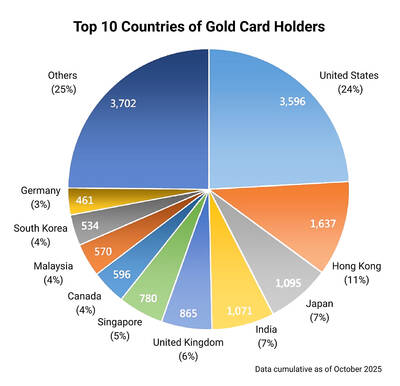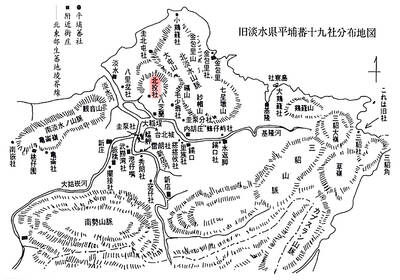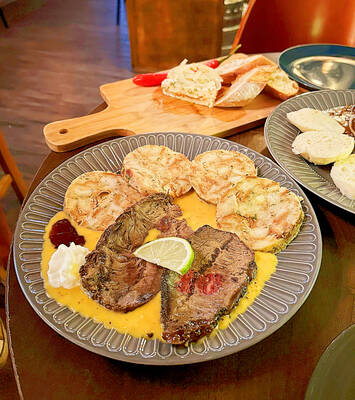Each spring, cherry blossoms and calla lilies bloom on Yangmingshan (陽明山) and are celebrated with flower festivals. Now, the stars of the mountains are butterflies, as the Yangmingshan Butterfly Festival (陽明山蝴蝶季) reaches its climax this weekend with activities and tours organized by Yangmingshan National Park Headquarters (陽明山國家公園管理處) and the Butterfly Conservation Society of Taiwan (台灣蝴蝶保育學會).
This year’s event features milkweed butterflies. Of the 13 species of milkweed butterflies in Taiwan, 11 are found on Yangmingshan. They are easily spotted along the 2.5km trail connecting the Erziping (二子坪) outdoor parking lot and Datun Mountain (大屯山). What draws the fairy insects is the nectar of the eupatorium shimadai, a plant that flowers in the Datun Mountain area.
The best time of the day for butterfly-watching is in the morning. Milkweed butterflies take off in clusters from their bushy homes in the early morning and begin to return in the afternoon. Blue and chestnut tiger butterflies are especially unafraid of humans, making close observation and appreciation easy.
“This is like a cafeteria for them. Butterflies come, stuff themselves and leave,” said Lin Po-chang (林柏昌), secretary-general of the Butterfly Conservation Society of Taiwan.
Seventeen stalls will be set up around the parking lot and along “butterfly road” tomorrow and Sunday, offering information on the insects through educational games, workshops and exhibitions for children and adults. Visitors can join guided tours and watch butterflies in their natural habitat while strolling along the road.
“Each butterfly is an individual,” said Lin. “Some are laid-back, and some are jittery.”
Traffic controls will be in place for the weekend. Visitors can take the No. 260, No. 230, No. 110 or Red 5 (紅5) bus to Yangmingshan National Park and transfer to free shuttle buses to the Erziping parking lot. Cyclists are free to tackle the often steep mountain roads on two wheels.
For those interested in signing up for the guided tours, visit webs.ymsnp.gov.tw/web/butterfly/2009. Or call (02) 2861-6341 X800 or X801.

Seven hundred job applications. One interview. Marco Mascaro arrived in Taiwan last year with a PhD in engineering physics and years of experience at a European research center. He thought his Gold Card would guarantee him a foothold in Taiwan’s job market. “It’s marketed as if Taiwan really needs you,” the 33-year-old Italian says. “The reality is that companies here don’t really need us.” The Employment Gold Card was designed to fix Taiwan’s labor shortage by offering foreign professionals a combined resident visa and open work permit valid for three years. But for many, like Mascaro, the welcome mat ends at the door. A

The Western media once again enthusiastically forwarded Beijing’s talking points on Japanese Prime Minister Sanae Takaichi’s comment two weeks ago that an attack by the People’s Republic of China (PRC) on Taiwan was an existential threat to Japan and would trigger Japanese military intervention in defense of Taiwan. The predictable reach for clickbait meant that a string of teachable moments was lost, “like tears in the rain.” Again. The Economist led the way, assigning the blame to the victim. “Takaichi Sanae was bound to rile China sooner rather than later,” the magazine asserted. It then explained: “Japan’s new prime minister is

NOV. 24 to NOV. 30 It wasn’t famine, disaster or war that drove the people of Soansai to flee their homeland, but a blanket-stealing demon. At least that’s how Poan Yu-pie (潘有秘), a resident of the Indigenous settlement of Kipatauw in what is today Taipei’s Beitou District (北投), told it to Japanese anthropologist Kanori Ino in 1897. Unable to sleep out of fear, the villagers built a raft large enough to fit everyone and set sail. They drifted for days before arriving at what is now Shenao Port (深奧) on Taiwan’s north coast,

Divadlo feels like your warm neighborhood slice of home — even if you’ve only ever spent a few days in Prague, like myself. A projector is screening retro animations by Czech director Karel Zeman, the shelves are lined with books and vinyl, and the owner will sit with you to share stories over a glass of pear brandy. The food is also fantastic, not just a new cultural experience but filled with nostalgia, recipes from home and laden with soul-warming carbs, perfect as the weather turns chilly. A Prague native, Kaio Picha has been in Taipei for 13 years and